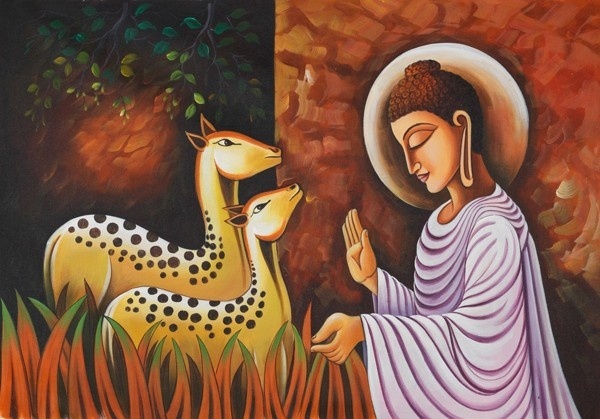
Course Description
What did the Buddha teach about animals? How should we treat animals today? How have Buddhist communities throughout history thought about animals? Were all Buddhists vegetarian?
In this course, we will take a look at some of the ways that the Buddhist tradition has approached non-human animals. There is a basic tension at the heart of Buddhist attitudes towards animals: animals are seen as like us in the sense that we share a capacity for suffering but unlike us in that animals lack human intelligence. We will explore this tension as it plays out in Buddhist art, literature, ritual, and philosophy. We will also explore ongoing debates about vegetarianism, and end by reflecting on contemporary issues surrounding animals in Buddhism.
Few of the issues we discuss in this course have simple answers. Often, we will hear multiple Buddhist voices taking opposing views. In addition, our understanding of animals is changing, particularly as new research emerges on animal cognition. Throughout the course's four modules, we will see that there hasn't been a single Buddhist approach to animals and that there aren't any blanket conclusions about what Buddhists should or should not do. By the end of the course, however, you will hopefully feel better equipped to make decisions about how to think about and interact with animals in your own life.

Course Modules
Module 1 — Attitudes Towards Animals
Module 2 — Animals in Buddhist Ritual
Module 3 — The Question of Vegetarianism
Module 4 — Contemporary Challenges
Students Will Receive:
- 4 Video + Audio lectures (90 min)
- 4 Prerecorded Q&A sessions (90 min)
- 4 BS Credits
- 12 Hours of CE credit with YA
- Course Syllabus (PDF)
- Weekly Readings (PDF)
- 4 Multiple Choice Quizzes
- Yogic Studies Certificate (PDF)
- Access to Yogic Studies Community
Dr. Geoffrey Barstow
Associate Professor of Religious Studies, Oregon State University
Dr. Geoffrey Barstow first encountered Tibetan Buddhism in 1999, and since that time the study of Tibetan religion, history, and culture has been the focus of his professional life. For the last decade and a half, his research has focussed on the history and practice of vegetarianism on the Tibetan plateau, asking questions about how animals were viewed, how they were treated (i.e., eaten), what that can tell us about Tibetan Buddhism, and how Buddhist ideas about animal ethics might impact broader philosophical discussions. His published work includes Food of Sinful Demons: A History of Vegetarianism in Tibet (Columbia University Press) and The Faults of Meat: Tibetan Writings on Vegetarianism (Wisdom Publications).

This course is eligible for 12 hours of Continued Education (CE) credits with Yoga Alliance

Stay Informed
Sign up for the Yogic Studies mailing list to find out first about upcoming courses, podcast episodes, promotions, events, and the latest research delivered straight to your inbox.

